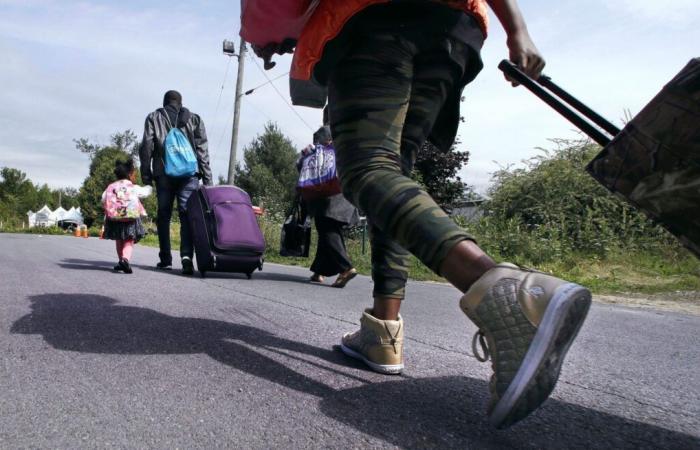While a wave of panic is spreading in certain communities in the United States, experts believe that we must prepare now for waves of immigration at the Canadian border, like the Quebec political class. The rush could be rapid and more “disorderly” than that of Roxham Road, they say, and the crossings more “perilous”, since the normal routes are almost entirely blocked.
On the campaign trail, Donald Trump promised to launch the largest immigrant deportation program in history on Day 1 of his presidency using the Alien Enemies Act, a piece of legislation written for times of war. More than 11 million people live without status in the United States, and hundreds of thousands more have temporary status that expires in the coming months.
“The government must prepare to face a potential humanitarian crisis. » This blunt exhortation comes from Fen Hampson, president of the Global Council on Refugees and Migration.
If these people do not qualify to request asylum at a border crossing based on the rare exceptions, it is “through the woods” and possibly during the winter that they will attempt their passage to Canada, foresees Stephan Reichhold, director of the Table de concertation des organizations serving refugees and immigrants. Crossings are already “more perilous” since the “closure” of Roxham Road, and the risk “will intensify,” warns this long-time observer.
At the border, the Royal Canadian Mounted Police (RCMP) are already active in anticipation of an increase in crossings from our neighbors to the South. In an exchange with DutySergeant Charles Poirier confirmed that the election of Mr. Trump was likely to have “a big impact on the number of irregular entries into Canada”. A “contingency plan” which determines the additional resources to be deployed at the border has been developed.
Fearing migratory “turbulence” a year and a half after the closure of Roxham Road, the Prime Minister of Quebec, François Legault, nevertheless affirmed on Wednesday that he wanted to ensure “that the federal government protects [les] borders” with the United States.
In a press scrum a little later, his Minister of Public Security, François Bonnardel, made it clear that this was not a question of assigning the Sûreté du Québec to the surveillance of irregular immigrants. “We will respond if necessary, but beyond all that, it remains a [responsabilité] of the RCMP. For the moment, I am reassured,” he told the parliamentary press.
“Risk of panic”
Even though he has “no crystal ball,” professor of public international law at McGill University François Crépeau believes that “it’s going to be complicated and dirty” if Trump puts all his plans into action. Those who “no longer have a place in the United States” will be encouraged to leave, whether to return to their country of origin or to the Canadian border.
“I believe that in fact, there is a risk of a panic effect,” also maintains Adèle Garnier, professor of geography at Laval University and specialist in forced migration. The context has changed significantly since 2017, when many accused a tweet from Justin Trudeau of having encouraged migration to Canada. “It would surprise me this time if we say that we are going to protect people in Canada. We are no longer in the same state of mind at all, and the rhetoric has changed a lot. »
In Ottawa on Wednesday, several ministers from the Trudeau government wanted to play down Mr. Trump’s return to power. Deputy Prime Minister Chrystia Freeland stressed that it was “normal to be worried,” while assuring that “everything will be fine” for Canada. Also accosted, his colleague Minister of Immigration, Marc Miller, briefly alluded to the importance of regulated immigration. On Tuesday, he had already revealed the existence of a plan aimed at preparing Canada for a possible mass arrival of undocumented immigrants.
In the National Assembly, both François Legault and the leader of the Parti Québécois, Paul St-Pierre Plamondon, said on Wednesday they feared a massive influx of migrants, in the context where nearly 600,000 non-permanent residents currently populate Quebec.
“Already, our reception capacity, our integration capacity, is exceeded”, underlined the CAQ Prime Minister while announcing the creation of a ministerial working group dedicated to preparing the transition of powers in the country of the Uncle Sat.
More messy
“I think this is where we will see the absurdity of having closed Roxham Road,” underlines François Crépeau. The risk is “loss of control”: “With Roxham, we had a system where we recorded all the people who returned. And they weren’t in any great danger, because all they had to do was take a taxi. They were entering into an organized process. »
A “very harsh” reaction from Canada could only add to the “chaos,” fears this expert.
Smugglers and criminal groups have seized the business of irregular migration, he recalls, just as Mr. Reichhold describes it: “I am convinced that the smugglers are already organized for what is to come. »
Under the Safe Third Country Agreement and its expansion in 2023, there is no “legal obligation” to accept migrants from the United States, except under five exceptions, recalls Fen Hampson . Canada could decide to send them back once they have crossed and stayed less than 14 days in the territory — “but there is also a humanitarian obligation that they be taken care of, and that is what could be a challenge.”
With the RCMP having demolished its last building on Roxham Road a year ago, could we see the Canadian army setting up tents at the border like in the summer of 2017? “Yes,” he says bluntly, since the Canadian military is the best equipped from a logistical point of view, at least “in the short term.” “I’m not saying it’s going to happen, but we should certainly be concerned about it,” said this professor of international affairs at Carleton University.
In 2017, several promises from the Trumpist campaign were quickly implemented. More than 60,000 people sought asylum at the land border with Canada during the populist’s first term. Many had made a long journey through the Americas, but others came directly from the United States, for fear that their “temporary protected status” would expire. This status consists of permission to remain on American territory when it is too dangerous to return to one’s country of origin.
There are almost 10 times more people holding this status today than in 2017, with estimates numbering more than 850,000 people. These temporary statuses last from 6 to 18 months: Trump could simply choose not to renew them again.
—
A previous version of this text was edited to add clarification.






